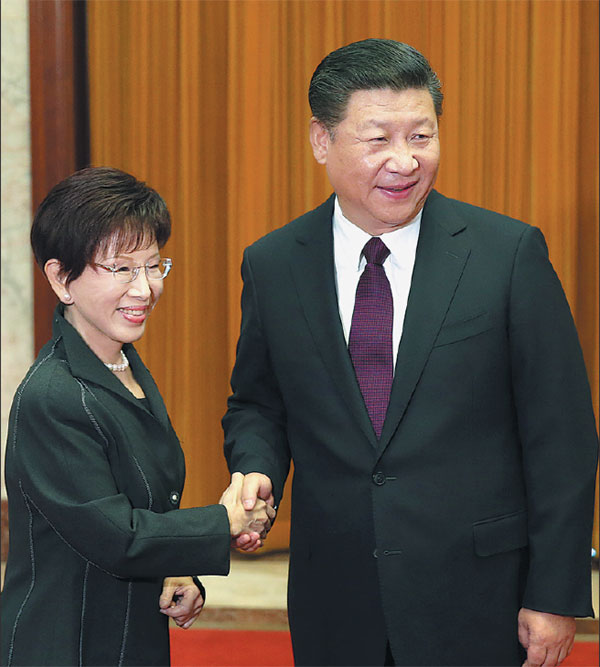Xi affirms one-China policy
By Peng Yining (China Daily) Updated: 2016-11-02 06:48Leaders of CPC, KMT emphasize opposition to forces supporting "Taiwan independence"
Xi Jinping, general secretary of the Communist Party of China Central Committee, met with Hung Hsiu-chu, the visiting chairwoman of Taiwan's Kuomintang party, and called for officials on both sides of the Taiwan Straits to remain committed to the one-China consensus.
Holding talks with a delegation led by Hung at the Great Hall of the People in Beijing on Tuesday, Xi said ensuring national integrity and protecting the fundamental interests of the Chinese nation is the "common will of all Chinese people".
Xi stressed the importance of the 1992 Consensus, essentially a commitment to the one-China policy, which official delegates from both sides of the Straits agreed upon in November 1992.
Xi made a six-point proposal on cross-Straits relations, including adhering to the 1992 Consensus, resolutely opposing forces supporting "Taiwan independence", promoting social and economic cooperation between the two sides and working together to carry forward Chinese culture.
"Two parties' contributions to the peaceful development of cross-Straits relations has been written in history," Xi added. "The two sides across the Straits have become an integral whole with a common destiny."
It is Hung's first trip to the mainland since she became head of the KMT on March 30. It also marks the first visit by a KMT leader since the party lost Taiwan leadership and a legislative majority to the Democratic Progressive Party in the January elections.
During her meeting with Xi, Hung said that CPC and KMT should expand exchanges between the two sides, including economic cooperation and interactions among young people.
She also stressed her stance on opposing "Taiwan independence" during her meeting with top political adviser Yu Zhengsheng on Tuesday.
Hung arrived in Nanjing, capital of Jiangsu province, on Sunday to start a five-day visit, making her first stop the Mausoleum of Sun Yat-sen, the founding father of the KMT.
On Wednesday, she will attend a forum on peaceful development of cross-Straits ties.
The meeting between Xi and Hung is the most significant event since the DPP took Taiwan's leadership in May, said Ni Yongjie, deputy director of the Shanghai Institute of Taiwan Studies.
"Cross-Straits relations have entered a cold period since the DPP takeover. The interaction between KMT and Communist Party of China, however, helps to maintain peace and stability across the Taiwan Straits," said Ni.
In addition of talks with high-level leaders of the CPC, Hung's visit also has led to exchanges among people from both sides, according to Ni.
"Her visit to the Sun Yat-sen Mausoleum and a technology hub in Beijing has drawn the public's attention and reminded people of the positive side of cross-Straits relations. Despite the difficult political situation, the exchange and mutual trust among people from two sides still exists," he said.
pengyining@chinadaily.com.cn
Highlights
Xi Jinping's six-point proposal on cross-Straits relations:
Adhering to the 1992 Consensus, which affirms the one-China principle;
Resolutely opposing forces supporting "Taiwan independence" and their activities;
Promoting the integrated social and economic development of cross-Straits societies;
Working together to carry forward Chinese culture;
Boosting the well-being of people across the Taiwan Straits;
Dedication to realizing the great rejuvenation of the Chinese nation in concerted efforts.
Base for entrepreneurs points the way, Hung says
Hung Hsiu-chu, chairwoman of Taiwan's Kuomintang party, visited a youth entrepreneurship base in the Zhongguancun technology hub in Beijing on Tuesday, encouraging young people in Taiwan to increase exchanges and cooperation with their mainland peers.
The visit was Hung's second stop during her five-day trip to the mainland. On Monday, she paid tribute to Sun Yat-sen, the KMT's founder, at his mausoleum in Nanjing, Jiangsu province.
The entrepreneurship base, Vstartup, launched a branch in October that specifically provides service to young Taiwan entrepreneurs and has received 14 startups from the island.
The Taiwan entrepreneurs have been provided with rich information that will help them succeed in developing their business on the mainland, Hung said after a talk with a delegation of young Taiwan people who run companies at the base.
"When you have achieved big success, I hope you will bring your experience back to Taiwan and cooperate with young people in Taiwan," Hung said.
An atmosphere on the mainland that is favorable to entrepreneurship is encouraging many talented young people from Taiwan to make their dreams come true on the mainland, according to a report released by the Taiwan Affairs Office of the State Council in August.
The mainland has founded 41 cross-Straits youth entrepreneurship bases, in locations including Fujian and Zhejiang provinces, to attract Taiwan's young people to start businesses on the mainland and to encourage exchanges among young people from both sides, the report said.
Li Yihu, head of Peking University's Taiwan Institute, said exchanges among the younger generation from both sides have contributed to a peaceful development of cross-Straits relations.
"Many exchanges and communication have been suspended due to the current political situation, but the exchanges and cooperation among young people in the innovation field still go on," said Li. "It plays an important role in helping to dissolve misunderstandings and also gives hope for the future."
Peng Yining
|
Xi Jinping, general secretary of the Communist Party of China Central Committee, meets with Taiwan's Kuomintang party leader Hung Hsiu-chu in Beijing on Tuesday. Wu Zhiyi / China Daily |
- 'Cooperation is complementary'
- Worldwide manhunt nets 50th fugitive
- China-Japan meet seeks cooperation
- Agency ensuring natural gas supply
- Global manhunt sees China catch its 50th fugitive
- Call for 'Red Boat Spirit' a noble goal, official says
- China 'open to world' of foreign talent
- Free trade studies agreed on as Li meets with Canadian PM Trudeau
- Emojis on austerity rules from top anti-graft authority go viral
- Xi: All aboard internet express












